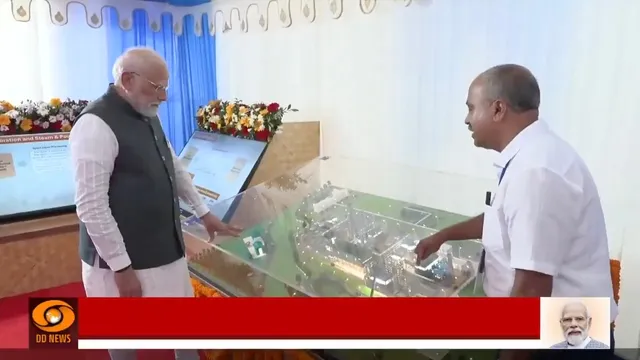Prime Minister Narendra Modi has inaugurated two significant projects in Assam – a Bioethanol Plant and a Polypropylene Production Unit – marking a crucial step toward India’s vision of becoming an energy-efficient, self-reliant, and environmentally sustainable economy. These projects not only boost Assam’s industrial development but also align with the nation’s “Atmanirbhar Bharat” and Net Zero 2070 goals.
Overview of the Projects

1. Bioethanol Plant
The bioethanol project in Assam is aimed at producing ethanol from agricultural feedstock like maize, rice husk, and other surplus grains. This project supports India’s Ethanol Blending Program (EBP), which targets 20% ethanol blending with petrol by 2025.
Key Features:
- Annual production capacity of 100 kilo-litres per day (KLPD).
- Will utilize surplus grains and crop residues from farmers, reducing stubble burning and agricultural waste.
- Expected to save crores in crude oil imports by blending ethanol with fuel.
2. Polypropylene Production Unit
The polypropylene project is a major boost for the petrochemical sector in Northeast India. Polypropylene is a key raw material for manufacturing products such as plastic packaging, automotive parts, medical equipment, and textiles.
Key Features:
- Large-scale production capacity to meet rising domestic demand.
- Will generate employment opportunities for local youth and promote downstream plastic industries.
- Reduces dependency on imports and contributes to Make in India.
Why These Projects Are Important
1. Energy Security & Import Reduction
India imports nearly 85% of its crude oil requirements. Ethanol blending can help reduce this dependence, saving valuable foreign exchange. The Assam bioethanol plant is expected to contribute significantly to this goal while supporting farmers with an additional source of income.
2. Environmental Sustainability
Bioethanol is a clean-burning fuel, reducing carbon emissions by almost 30-50% compared to conventional petrol. This directly supports India’s climate action commitments under COP26.
3. Industrial Growth in the Northeast
These projects are a major step in the government’s push to develop the Northeast as an industrial hub. The polypropylene unit will attract small and medium plastic manufacturing enterprises, creating a robust ecosystem in Assam.
PM Modi’s Vision for the Northeast
During the inauguration, PM Modi reiterated that the government is committed to transforming the Northeast into a gateway of development. He highlighted that industrial projects like these will:
- Bring infrastructure growth, investment, and connectivity to the region.
- Empower local communities with job opportunities and entrepreneurship support.
- Improve India’s overall energy resilience.
Farmer and Youth Benefits
Benefits for Farmers
- Surplus produce that would otherwise go to waste can now be sold to bioethanol plants, increasing farmers’ income.
- Reduction in stubble burning will improve air quality and soil health.
Benefits for Youth
- Thousands of direct and indirect jobs are expected to be generated in operations, logistics, and downstream industries.
- Skill development opportunities will arise in modern petrochemical and biofuel technologies.
Contribution to India’s Ethanol Blending Target
India’s E20 target (20% ethanol blending) is crucial for reducing greenhouse gas emissions, cutting import bills, and supporting rural economies. With projects like the Assam bioethanol plant, India is moving steadily toward achieving this target five years ahead of schedule.
Economic Impact
These projects are expected to significantly boost Assam’s economy:
- Increase in state revenue through taxes and industrial activity.
- Development of ancillary industries, such as packaging, transport, and biofuel logistics.
- Promotion of entrepreneurship among local MSMEs in the petrochemical value chain.
Aligning with National Initiatives
These inaugurations are aligned with several national schemes and visions:
- Make in India & Atmanirbhar Bharat: Encouraging domestic manufacturing and reducing import dependence.
- National Biofuel Policy: Promoting cleaner fuel alternatives and waste-to-wealth technologies.
- Act East Policy: Strengthening Northeast India’s economic linkages with Southeast Asian markets.
Challenges and the Way Forward
While the projects are a huge milestone, certain challenges need to be addressed:
- Consistent Feedstock Supply: Reliable sourcing of biomass and grains is crucial for uninterrupted bioethanol production.
- Infrastructure Development: Efficient transportation and storage facilities must be built to handle output at scale.
- Environmental Compliance: Sustainable practices must be ensured to avoid overexploitation of natural resources.
The government has assured that a robust monitoring mechanism and public-private partnerships will ensure these challenges are overcome.
Conclusion
The inauguration of the Bioethanol Plant and Polypropylene Production Unit in Assam is a landmark step in India’s journey toward clean energy, industrial self-reliance, and regional development. These projects not only support the nation’s energy transition goals but also bring socio-economic transformation to the Northeast, empowering farmers, youth, and local businesses.
As PM Modi emphasized, these initiatives symbolize India’s determination to create a green, sustainable, and self-reliant future, turning the Northeast into a hub of innovation and growth.

